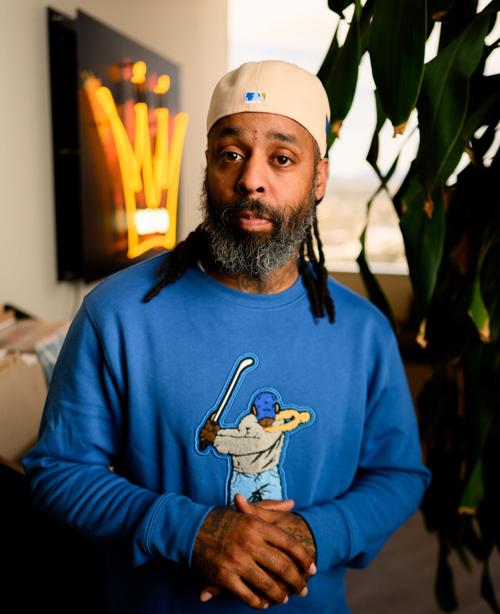For years, Dominic Harris and Michael Tolle traveled in the same Tucson musical circles.
They would talk about collaborating — Harris, aka Tucson rapper Cash Lansky, behind the mic and Tolle at the mixing console of his Mello Music Group studio.
Last fall, those conversations bore fruit when Tolle signed Harris to his 17-year-old nationally celebrated Tucson indie label.
Mello, with a roster of nearly two dozen rap, hip-hop, soul and jazz artists, released Harris’s label debut, “Man of the House” on April 26.
“I think being on Mello feels like I reunited with family. Mello feels like home to me,” said Harris. “I think it’s going to get my music where it needs to be.”
Signing with Mello comes more than a dozen years into Harris’s music career, which has always been a part-time thing, relegated to evenings and weekends, when he’s not at his pay-the-bills day job. Last month the 39-year-old father of four marked his 20th anniversary working for Banner UMC.
His family is a large part of the story behind the album’s title.
“Growing up in a single-parent household, and being a Black kid in America, we are given these titles,” he explained, and as the oldest of his siblings, his mom told him he was the “man of the house” not long after divorce took the family away from their native Pittsburgh, then to Alaska before settling in Tucson when Harris was 14.
“I didn’t see it as a bad thing; it was more of a pride thing and I wore it as a badge of honor growing up,” he said.
It’s a badge that he still wears proudly for his wife of 23 years and his four children.
“That has always been a promise that I made to my mom, that I would be the man of the house. And it’s a promise I made to my kids, to my wife, that regardless of what happens, I will always be the man that you need of this house,” he said.
His music reflects those family values, hitting on social justice and everyday life issues with a sense of hopeful optimism that we can all do better, be better. There is little to no cursing in his lyrics, with upbeat and innovative riffs that he admits might not appeal to everyone.
“It’s not meant for everybody, and I know that,” he said. “I don’t create the music to be for everybody, but it’s just for those people who know they have a life purpose. They don’t know what it is at that moment, but they are willing to work towards it to figure it out. They will never give up because they want to find the answer. I feel like my music is the soundtrack to that process.”
Several years ago, Harris was trying to imagine what it would take to push his music career to the point where he could quit his day job.
With Mello Music Group, which has a fanbase that extends throughout the country and into Europe and Canada, he thinks that could become a reality in a few years.
“It puts my music on a different radar that Mello has,” he said, recalling some of the comments Mello listeners have left on Spotify and other streaming platforms. “I feel like since we rolled out, I’ve been getting nothing but love even from overseas. It’s been cool; I’m still having fun.”
“Man of the House” is available on all major music streaming services, including Bandcamp, Apple Music and Spotify.
Tucson in the 1990s was more than just scrunchies and dial-up internet. Here are some archived snapshots from the decade.





